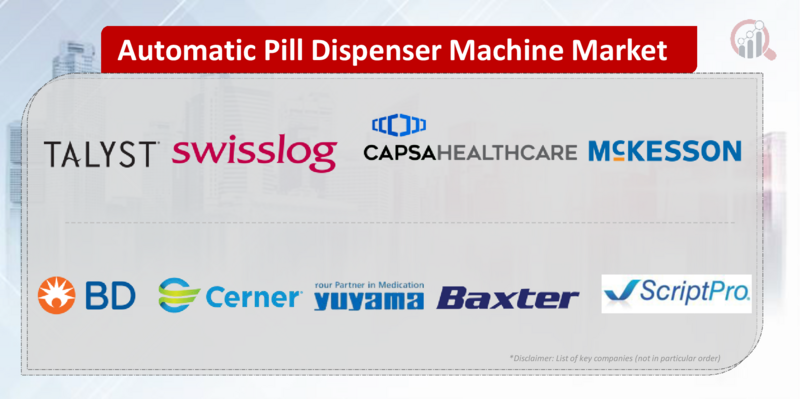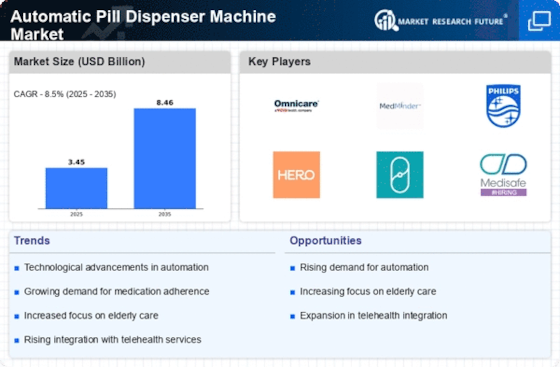Top Industry Leaders in the Automatic Pill Dispenser Machine Market
 *Disclaimer: List of key companies in no particular order
*Disclaimer: List of key companies in no particular order
Top listed global companies in the Automatic Pill Dispenser Machine industry are:
Talyst, Llc., Cerner Corporation, Mckesson Corporation, Capsa Healthcare, Scriptpro Llc, Baxter International Inc, Becton Dickinson &Company, Yuyama Co., Ltd., Omnicell, Swisslog Holding Ag
Bridging the Gap by Exploring the Competitive Landscape of the Automatic Pill Dispenser Machine Top Players
The automatic pill dispenser machine market driven by factors like the aging population, chronic disease prevalence, and technological advancements. This dynamic landscape hosts a diverse set of players, each vying for market share with distinct strategies and approaches.
Key Players and Their Strategies:
• Established players: Companies like Philips, Bosch, Tabula Rasa Healthcare, and Telecare Corporation leverage their brand recognition, extensive distribution networks, and R&D prowess to maintain market leadership. Philips, for instance, focuses on integrating its dispensers with telehealth platforms for remote patient monitoring.
• Regional players: Companies like Ainu Corporation (Japan) and Medikamentenversorgung Austria (Austria) cater to specific regional needs and regulations, building strong footholds in their respective markets.
• Start-ups: Emerging players like Pillbox Labs and Adherium are disrupting the market with innovative features like smartphone connectivity, remote refill capabilities, and AI-powered medication management. Adherium's smart pill bottle, for example, tracks medication adherence and sends data directly to caregivers.
Factors for Market Share Analysis:
• Product portfolio: Offering a diverse range of machines catering to different user needs (e.g., capacity, portability, connectivity) and medication types expands market reach. Companies like Tabula Rasa Healthcare provide dispensers for complex medication regimens, while Ainu Corporation focuses on compact, portable machines for travel.
• Technology and features: Advanced features like bio-metric authentication, remote scheduling, and medication tracking enhance user experience and medication adherence. Bosch, for example, integrates voice-activated dispensing features to cater to visually impaired users.
• Distribution channels: Partnerships with pharmacies, healthcare providers, and senior living communities provide wider access and customer trust. Philips leverages its existing healthcare network to promote its dispensers, while Medikamentenversorgung Austria collaborates with Austrian pharmacies for direct sales.
• Pricing and reimbursement strategies: Competitive pricing and insurance coverage expand market penetration. Telecare Corporation offers flexible subscription models, while Pillbox Labs targets Medicaid payers with budget-friendly options.
New and Emerging Trends:
• AI-powered medication management: Integrating AI algorithms for personalized medication reminders, dosing adjustments, and potential drug interactions can improve medication adherence and safety. Start-ups like Medido are leading the charge in this area.
• Telehealth integration: Connecting dispensers with telehealth platforms enables remote monitoring, medication adjustments, and virtual consultations, fostering better patient-provider communication. Companies like Bosch and Philips are actively pursuing this integration.
• Smart packaging and sensors: Integrating RFID tags or smart packaging with dispensers facilitates automatic medication identification and reduces dispensing errors. Companies like Adherium are developing such technologies.
• Focus on chronic disease management: Tailoring dispensers to specific chronic conditions like diabetes or Alzheimer's with specialized features and medication management protocols can address niche market needs. Tabula Rasa Healthcare, for instance, offers dispensers specifically designed for complex medication regimens.
Overall Competitive Scenario:
The automatic pill dispenser market is characterized by intense competition, with established players leveraging brand recognition and experience, while innovative start-ups disrupt the market with cutting-edge technologies. Success in this market hinges on offering feature-rich dispensers, building strategic partnerships, and adapting to evolving trends like AI integration and telehealth compatibility. Additionally, addressing specific medication management needs of chronic disease patients represents a significant growth opportunity. By focusing on these key factors and tailoring their strategies, players can secure a strong position in this dynamic and promising market.
Latest Company Updates:
Capsa Healthcare:
• Capsa Healthcare received FDA 510(k) clearance for its new MedCenter 4 dispensing robot in June 2023, designed for pharmacies and long-term care facilities. (Source: Capsa Healthcare press release, June 21, 2023)
McKesson Corporation:
• McKesson's McKesson Pharmacy Automation business unit continues to expand its portfolio of automated dispensing systems for hospitals and pharmacies.
Scriptpro LLC:
• Scriptpro acquired eMed Technologies in November 2023, a company specializing in medication adherence analytics and patient engagement solutions. This acquisition strengthens Scriptpro's offerings in medication adherence support. (Source: Scriptpro press release, November 7, 2023)
Yuyama Co., Ltd.:
• Yuyama launched its new PillCap G5 automatic pill dispenser in July 2023, featuring advanced biometric authentication and remote monitoring capabilities. (Source: Yuyama press release, July 5, 2023)










